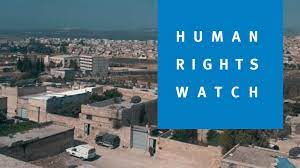President Bashar al-Assad has promulgated Law No. (12) for the year 2024, focused on safeguarding electronic personal data within the digital sphere, SANA reported. This legislation marks a “significant step forward in the protection of citizens’ privacy online, setting forth rigorous guidelines for the collection, processing, utilization, and transfer of personal data”, according to the pro-government agency.
It adds that the primary objective of this law is to fortify the confidentiality of personal information traversing the digital network and to establish a robust legal framework to penalize unauthorized activities involving personal data. In a bid to deter such illicit acts, the law prescribes stringent financial penalties that can escalate to as much as 12 million Syrian Pounds (SYP), alongside possible imprisonment terms of up to three years for violators.
Syrians Face Dire Conditions in Turkish-Occupied ‘Safe Zone’
Human Rights Watch has reported dire conditions for Syrians deported or coerced into returning to Tel Abyad, a Turkish-occupied district in northern Syria. Between January and June 2023, a significant increase in the number of Syrians being sent back to this area was observed, with claims of voluntary return often masking the true nature of these deportations. Research indicates that since 2017, Turkish forces have been involved in forcibly returning thousands of Syrian refugees, sometimes under the guise of “voluntary” returns, exacerbating the humanitarian crisis in Tel Abyad.
The region, under the control of the Turkish-backed Syrian National Army since 2019, is described as lacking in basic humanitarian conditions, with severe restrictions on access to livelihoods and safe passage to other parts of Syria. Deportees have reported being separated from their families, detained without cause, and coerced into signing documents they do not understand. The lack of operational crossing points has left many relying on dangerous and costly smuggling routes to escape.
Turkey’s efforts to establish “safe zones” in northern Syria have been criticized due to the proliferation of human rights abuses and potential war crimes committed by Turkey-backed armed groups. A Human Rights Watch report highlighted the involvement of Turkish forces in overseeing such abuses.
Interviews with deportees reveal a bleak picture of life in Tel Abyad, with many struggling to find work, shelter, or enough food to survive. The situation is made worse by the absence of adequate humanitarian aid and the high risk and cost associated with smuggling routes out of the area. Despite international law obligations, Turkey’s actions have led to increased suffering for those deported to Tel Abyad, raising serious concerns about the protection of human rights and the principle of non-refoulement.
Mazloum Abdi: Three parties are attacking northeast Syria
The General Commander of the Syrian Democratic Forces (SDF), Mazloum Abdi, stated that three parties are attacking areas under his forces’ control in northeast Syria, namely Turkey, the Syrian regime, and the Islamic State organization, Enab Baladi reported.
Abdi’s comments came during the Future Syria Party conference held on Wednesday in the city of Raqqa in northeast Syria.
He added in his recorded speech on Wednesday, March 27, that Turkey continues to attack the areas in northeast Syria in an attempt to “create instability in it, and force its inhabitants to migrate from it.”
Abdi referred to the Syrian regime and its allies also trying to “destabilize the region” through their direct security interventions, and attempts to create “discord” among the components of the region and society’s categories.
He considered that the “danger” of the Islamic State organization is still present and poses a threat to the peoples of the region and the whole world.
The SDF commander said that the daily security operations in partnership with the allies (International Coalition Forces) carried out by his forces against the organization, have prevented the Islamic State activities from getting out of control.
How German money funds war crimes in Syria
DW published a detailed report showing how Syrians residing in Germany face the paradox of contributing financially to the Assad regime through mandatory passport fees, despite fleeing the government’s oppression.
Activists and Syrians argue that the German government’s requirement for Syrian nationals to obtain new passports directly funds a regime sanctioned by Germany itself. Syrians seeking to integrate and acquire German citizenship, like Adam Yasmin, resist this requirement due to ethical objections and personal histories of persecution.
Germany’s policy, deemed as contributing between €14 million to €37 million annually to Assad’s government, contrasts with earlier practices where Syrians were issued alternative identification. The shift towards uniformity in passport rules across German states, particularly following directives by former Interior Minister Horst Seehofer, has heightened scrutiny and criticism of this approach.
Advocacy campaigns like #DefundAssad highlight the financial boon these passport fees provide to the Assad regime, emphasizing the need for policy reconsideration. Comparatively, other EU countries offer more lenient approaches towards Syrian refugees, not requiring them to renew their Syrian passports and acknowledging the unreasonableness of interacting with the regime they fled.
Efforts to challenge and change the current German policy face resistance, though no new legislation is needed—merely a reinterpretation of existing rules. Critics argue this policy not only undermines Syrians’ attempts at integration but also inadvertently supports a regime responsible for widespread human rights abuses.


